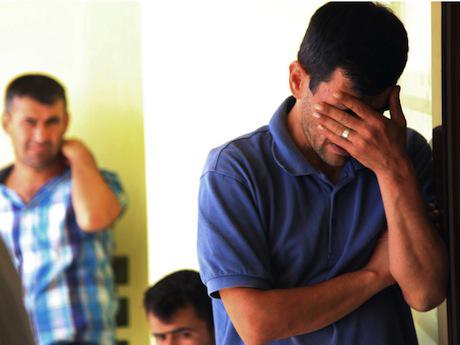Wake Up Call for the World
Mark 8:27-38
I never can read today’s passage from Mark’s gospel without memories of childhood road trips instantly springing to mind.
I can still see my parents up in front, my dad at the wheel, my Mom on the passenger side of the car with her left arm slung over the back of the front bench seat passing out snacks, or cleaning up spills, or trying to keep us in line. And the five of us kids crammed into the back of our early 1970s Plymouth Station wagon, spending some of our time playing cards…or coloring or something constructive like that, but most of our time arguing over who was taking whose space and why that was unfair.
Occasionally, things in the back of the car would get out of control—there may have been (from my recollection) occasional hair-pulling or leg pinching incidents. And when that happened, Dad would finally have to get involved. He’d keep his left hand on the steering wheel but turn his whole body toward us and yell over the front seat, “Kids, if you don’t stop that behavior right now, so help me I am going to pull this car over to the side of the road and give you a piece of my mind you won’t forget! We do not behave this way in our family!”
And then we’d all be appropriately chastised, so we’d quiet down. For about a minute. Two, if my parents were lucky.
Sound familiar?
The passage we heard today from Mark’s gospel, chapter 8, is almost like peering into a private family feud not unlike the exchanges on my family’s road trips. If you’d like, please feel free to look at the text along with me in your pew Bibles or on your smart phones. We’re in Mark, chapter 8 verses 27-38, in a little pericope of scripture that is filled with…rebuking. Correction.
Take a look: Jesus is talking with his disciples about their shared story—his identity and message to the world—and he sternly orders them to keep it quiet. Then he starts teaching them a little more about what following him really means: he begins talking about suffering and dying and a whole bunch of things that sound a little crazy. So Peter, one of his disciples, pulls Jesus aside and begins rebuking HIM. But Jesus, about as annoyed as my father on a road trip, responds to Peter by telling him to stop. Then Jesus turns to the whole crowd and summarizes his message: that following him means giving up everything; that it’s not a walk in the park; that this is going to be hard. He rebukes the crowd, in other words—for any thought otherwise.
And in all of this conversation you can see Jesus further clarifying the message he came to teach his disciples.
Personally, I don’t blame the disciples for their confusion. This little passage in Mark’s gospel comes right at the very mid-point of the story, and it’s kind of like a hinge: there were 8 chapters of build-up to this passage, after which the story heads toward Jerusalem. Toward conflict and suffering, and a cross.
Up until this point, Jesus’ closest disciples and, increasingly, the crowds surrounding him, had experienced Jesus as a fiery, compelling preacher; as a miracle worker who regularly healed people in public; as someone who gave a community starved for food, bread; and starved for a future, hope. In fact, his disciples had left their very lives to follow him.
And, until now, from all accounts, that decision seemed to have been a good one. Jesus had all the makings of a great politician, someone who would deliver them once and for all from Roman domination; from the pain of their poverty; from their eternal quest to make their lives mean something. They followed him in hopes that he would and could be their escape, that he was there to turn a new page, that he would indeed usher in a new “kingdom” in which their lives would be easy.
But this story, this point in the gospel, is right where things start to change, where the disciples begin to understand their shared story as followers of Jesus a little differently than they had before.
We see this tension most clearly in Jesus’ interaction with Peter, his infamous deeply ardent and often misguided disciple. Remember, Peter took Jesus aside and asked him to stop saying such upsetting things. But Jesus came back with words that still sting over 2000 years later: “Get behind me, Satan! For you are setting your mind not on divine things but on human things!”
One scholar says that Jesus is saying: “Get back in line, Peter. You seem to have momentarily forgotten what you know about what it means to follow me.”[1] In other words, “You’re out of line; it’s time to shape up—we don’t behave that way in our family!”
Peter was the one who raised the questions out loud, but I’ll bet all the disciples were thinking the same thing. They had no interest in talking about pain, suffering death. And they certainly had no interest in hearing about something as horrifying as a cross.
But this is important, what’s happening here: Jesus is further refining the disciples’ understanding of what it really means to be his followers, to live the gospel.
This idea of identity, of who we’re trying to be together, was important for the disciples to think about, and it’s important both for who we are as the family of faith at The Riverside Church and who we as Christians and all people of faith and good conscience hope to be in this world full of pain and brokenness.
We saw it just this week, again, when our news outlets were filled with the story of another family, a family we came to know when we first set our eyes on the heartbreaking image of a toddler, dressed in a red T-shirt, blue shorts, and little black shoes, his lifeless body washed up on the shore of a Turkish beach.
He came from a small family—a family of four. Father’s name: Abdullah Kurdi. Abdullah and his wife Rehan, together with their two boys, 5-year-old Galip and three-year-old Aylan spent the last several years running, fleeing from three different villages in Syria, one after another, finally arriving in Turkey three years ago, where Abdullah worked on a construction site for about $17/day. The family couldn’t survive on that, so as the violence got close again, they decided to flee one more time, into Western Europe.
The narrative of this family had been one of trying, over and over again, to leave violence for safety, to make their way together in a community where they could build lives of dignity, and to raise their children in peace.
And so, scraping together 4000 Euros with the help of family overseas, Abdullah and Rehan, who was terrified at the thought of leaving because she couldn’t swim, along with their two little ones, paid smugglers, boarded a 15-foot boat under the cover of darkness, headed from a deserted beach in Turkey to a nearby Greek island.
Mr. Kurdi described what happened that night: “We went into the sea for four minutes and then the captain saw that the waves are so high, so he steered the boat and we were hit immediately. He panicked and dived into the sea and fled. I took over and started steering; the waves were so high; the boat flipped.”
 Speaking from a morgue after his rescue, Abdullah described fighting to keep his wife’s and his boys’ heads above water, hanging on to both boys, one under each of his arms, while they screamed, “Daddy, please don’t die.” He could see his wife struggling, too. Then, one by one he realized they’d died; so he closed his eyes and he opened his arms and he let them go.
Speaking from a morgue after his rescue, Abdullah described fighting to keep his wife’s and his boys’ heads above water, hanging on to both boys, one under each of his arms, while they screamed, “Daddy, please don’t die.” He could see his wife struggling, too. Then, one by one he realized they’d died; so he closed his eyes and he opened his arms and he let them go.
Abdullah said, “I did everything in my power to save them, but I couldn’t. My kids have to be the wake-up call for the whole world.”[2]
When Jesus rebukes his disciples and speaks plainly to the crowd here in Mark, chapter 8, he’s encapsulating the essence of what it means to be part of his family—the very core of what he came to teach us.
The disciples were living with a narrative of separation, of individual success, a sort of “I’m in and you’re out, how lucky am I?” narrative of life together. But Jesus had a completely different view of family—both the small family of disciples he was building, and the larger family of hurting humanity.
And Jesus’ view of family was not centered, as his disciples thought, on self-promotion, or even preservation. Instead, it had more to do with giving ourselves away; risking love; opening our hearts and our hands to live generously, full of welcome and connection, in this world.
Peter, the disciples in Jesus’ close group, the crowds surrounding him, and even all of us, over 2000 years later, often seem to think that following Jesus falls right in line with the narrative of strength and power and wealth, instead of the risky way of vulnerability and love. Peter was under the impression, as often are we, that the way of Jesus is safe and easy.
But if we have the courage to listen carefully, we’ll hear that Jesus says: a life of power and ease, alienation and self-promotion, is not how we behave in this family.
The truth is that following Jesus will hurt.
In my view, then, Peter was right to pull Jesus aside for a few words of correction. “Jesus,” you can imagine Peter saying, “you might want to rethink how you’re messaging this. Spin it a little! What you’re saying is offensive. It will turn people away. It will make people mad!”
And Peter was right.
But Jesus persisted in correcting the narrative of his family. And this little exchange should give us pause, should make us wonder why. Why did the disciples stay? Why would we love our neighbors when the likely result is push back from the powers of the world? Why would we ever risk a cross, as Jesus predicts?
Well, we would do that…we would adopt this radical way of living…because we know that it is the way to life.
Because we know that the other way…the way of exclusion and greed and power…the end result of that way, is a toddler wearing a red t-shirt and blue shorts, and little black shoes, lifeless, and washed up on the shore of a beach because his family could not make a life.
That’s why.
In the face of a world that values the strong over the weak, the rich over the poor, a false façade over a vulnerable reality, Jesus is calling us to take a different way. And this invitation doesn’t seem to make sense on the surface, but neither does the God we serve, who feeds the hungry and raises the dead, who brings wholeness out of the most broken pieces of our lives.
Let’s listen again to these hard, hard words of Jesus and hear his rebuke to all of us who choose the world’s story of wealth and power and independence over the way of love. That’s not the way we do it in our family. Instead, we’re invited to gather our courage and to live boldly into the compassionate, justice-filled way of Jesus.
If we had the courage to live out such a story, if Jesus’ way of radical love could be seen in our lives and the life of The Riverside Church, I think even we could be the change we long to see.
Together, we might even be a wake up call to the world.
Amen.
[1] “Rebuke or Recall? Rethinking the Role of Peter in Mark’s Gospel,” by Robyn Whitaker, The Catholic Biblical Quarterly, 75 no 4 Oct 2013, p 666-682.
[2] “Image of Drowned Syrian Boy Echoes Around World,” by Joe Parkinson and David George-Cosh, The Wall Street Journal, September 3, 2015.












